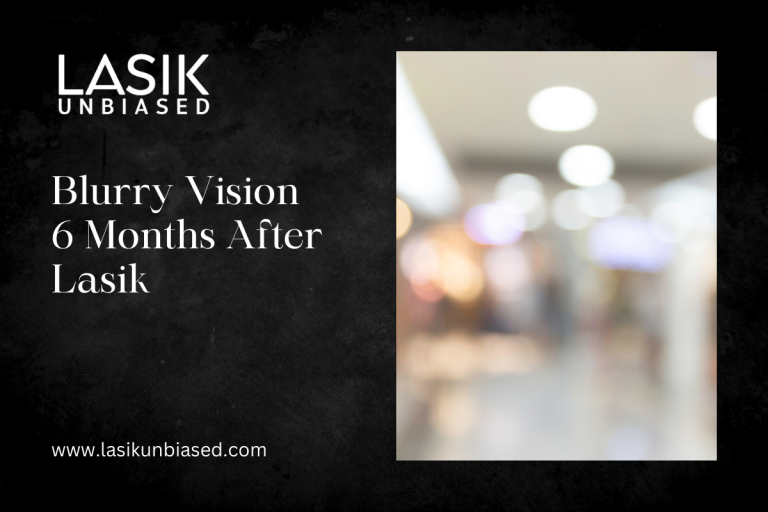Understanding Blurry Vision After LASIK
LASIK eye surgery is a highly effective procedure that corrects vision problems such as nearsightedness, farsightedness, and astigmatism. While most patients experience clear vision within a few days or weeks after surgery, some may still experience blurry vision months later. Blurry vision six months after LASIK is uncommon but not unheard of. However, in rare cases, it may indicate an underlying issue that requires medical attention.
Common Causes of Blurry Vision 6 Months After LASIK
1. Residual Refractive Errors
Some patients may still have minor refractive errors after LASIK. If the cornea does not reshape perfectly, slight nearsightedness, farsightedness, or astigmatism may remain. This can cause ongoing blurry vision. A follow-up visit with your eye doctor can determine if an enhancement procedure or prescription glasses are needed.
2. Dry Eye Syndrome
Dry eyes are one of the most common side effects after LASIK. For some patients, dry eyes can persist for several months, causing fluctuating blurry vision. Since LASIK temporarily affects corneal nerves that control tear production, dryness may take longer to resolve in specific individuals. Lubricating eye drops, staying hydrated, and avoiding excessive screen time can help improve tear production and reduce blurriness.
3. Post-LASIK Epithelial Ingrowth
Epithelial ingrowth occurs when cells from the cornea’s outer layer grow under the corneal flap created during LASIK. While rare, it can cause blurry vision, discomfort, and irritation. In mild cases, it resolves independently, but in more severe cases, an additional procedure may be needed to remove the cells.
4. Regression of Vision Correction
Sometimes, the eyes may revert slightly to their pre-LASIK condition, leading to mild blurry vision. This is known as regression. It is more common in patients with high prescriptions before surgery. If the regression is significant, an enhancement procedure may be required to refine the correction.
5. Corneal Irregularities
LASIK reshapes the cornea to improve vision, but in rare cases, it can lead to irregularities that cause blurry vision. Issues like corneal ectasia (a thinning and bulging of the cornea) can lead to visual distortions. A specialized contact lens or additional treatment may be necessary to correct the issue.
6. Cataracts or Other Eye Conditions
While LASIK corrects refractive errors, it does not prevent natural age-related eye conditions like cataracts. If blurry vision develops months after LASIK, it is essential to rule out cataracts, retinal issues, or other underlying eye diseases that may not be related to the surgery.
How to Improve Blurry Vision 6 Months After LASIK?
1. Use Lubricating Eye Drops
Since dryness is a leading cause of blurry vision, using preservative-free artificial tears can keep the eyes moist and reduce irritation. Consistently using eye drops throughout the day can make a significant difference.
2. Follow the 20-20-20 Rule
If you spend long hours on screens, take a break every 20 minutes to look at something 20 feet away for 20 seconds. This helps reduce eye strain and improves focus.
3. Wear Blue Light Glasses
If your blurry vision worsens with prolonged screen exposure, blue light-blocking glasses can help reduce digital eye strain and maintain eye comfort.
4. Maintain a Healthy Diet
A diet rich in omega-3 fatty acids, vitamin A, and antioxidants supports overall eye health. Salmon, carrots, spinach, and flaxseeds help improve tear production and visual clarity.
5. Avoid Rubbing Your Eyes
Rubbing your eyes can irritate the cornea and worsen blurry vision. Use artificial tears instead of rubbing if your eyes feel dry or itchy.
6. Use Prescription Glasses if Needed
If mild refractive errors remain, wearing prescription glasses for specific activities like driving or reading can help reduce strain and improve clarity. Your eye doctor can determine if temporary glasses are necessary.
7. Consider a LASIK Enhancement
If your vision has regressed or the initial correction was not fully effective, a LASIK enhancement procedure may be an option. Your eye doctor can evaluate whether a touch-up surgery is necessary to refine your vision.
When to See an Eye Doctor?
While mild blurry vision may improve with proper care, sure signs indicate a need for medical attention.
- Blurry vision that worsens instead of improving
- Severe dryness or discomfort that does not improve with eye drops
- Halos, glare, or double vision affecting daily activities
- Persistent redness or irritation in the eyes
These symptoms could indicate complications such as corneal irregularities, inflammation, or other eye conditions requiring treatment.
Blurry vision six months after LASIK is uncommon but can occur due to factors like dry eyes, minor refractive errors, regression, or corneal irregularities. In most cases, lubricating eye drops, reducing screen time, and maintaining proper eye care can help improve vision. However, if blurry vision persists or worsens, consulting an eye doctor is essential to rule out any underlying issues. LASIK patients can achieve long-term clear vision and eye health with proper care and follow-ups.


